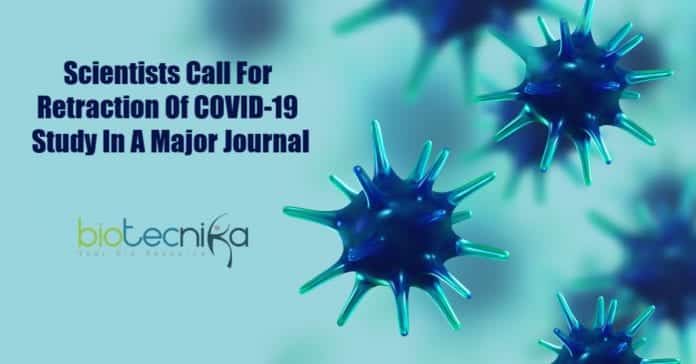Retraction Of COVID-19 Study In A Major Journal
A team of leading scientists is calling on a journal to withdraw a paper on the efficiency of masks, saying the research study has “egregious errors” and also consists of various “verifiably incorrect” statements.
“Given the scope and severity of the issues we present, and the paper’s outsized and immediate public impact,” the scientists wrote a letter to the journal editors on 18th June, asking to retract the research study immediately.
The letter follows heated criticism of 2 other significant coronavirus studies in May, which appeared in The Lancet and the New England Journal of Medicine. Amid concerns that rush to publish coronavirus study had worn down safeguards at distinguished journals – both documents were retracted.
The research currently under issue was released in the journal the Proceedings of the National Academy of Sciences – A Peer-reviewed journal on June 11, 2020. The lead author of the study is Mario Molina, who won the Nobel Prize in Chemistry in 1995, with two other researchers, for finding a link between depletion of the ozone layer and human-made chemicals.
The research claimed that mask-wearing substantially minimizes the number of infections with the coronavirus and
that other mitigation steps, such as social distancing executed in the US, are insufficient in safeguarding the general public. Additionally, the study also claimed that the primary method the virus spreads is via airborne transmission.Professionals said the paper’s verdicts resembled those from others – masks do function – however, they challenged the technique as deeply incorrect. For example, the scientists presumed that after policy changes the behaviors changed promptly, and the seismic adjustments occurring throughout societies that might have influenced the reported incidence of infection was not taken into consideration in the research study.
Linsey Marr, an expert on the airborne transmission of viruses, Virginia Tech, said, there is evidence from other researches that prove masks’ role in reducing the transmission of COVID-19, but this particular paper did not add to that evidence.
The journal is checking into the concerns raised asking for the retraction of this COVID-19 study, a P.N.A.S. spokeswoman said.
Dr. Molina is adamant about the conclusions of the paper. He understands things are complicated, and social distancing is sometimes perfect and sometimes not, he said in an interview. According to him those who criticized didn’t understand the paper.
Perhaps the language used in the paper was too strong, said Dr. Molina.
A lot of scientists think that social distancing is a significant factor in reducing viral transmission and that air-borne transmission, while it may occur, is not the major way by which viral transmission occurs.
Bill Hanage, an epidemiologist at the Harvard T.H. Chan School of Public Health, and one of the signatories, said masks are important interventions, but the paper is not able to compare masks with other interventions.
However, the paper was covered by news outlets as well as shared widely on social media. Many dismayed researchers on Twitter immediately criticized the paper.
Natalie Dean, a biostatistician at the University of Florida who signed the call for retraction of COVID-19 study, said, it is necessary to make clear that this paper is of poor quality because it’s making an extremely sensational claim”. And many flaws were identified while analyzing the paper.
Buzzfeed News reported about the scientists’ call for retraction.
The article was submitted under the “contributed” track, a little-known proviso, by which members of the National Academies are allowed to submit them to P.N.A.S. along with the manuscript and to get their own peer reviews. According to an analysis in 2016, around 20% of the papers that P.N.A.S. publishes are dealt with in this way.
Dr. Dean said it’s an old means of doing things. Even without proper expertise, individuals that are in the right groups get advantage this way.
Since a flood of reports with unvetted claims are appearing during the pandemic, the public should be able to rely on peer reviews at journals.
Selecting peer-reviewers by themselves will not help during a period like this. There are good reasons behind the selection of reviewers by journal editors and why their identities are kept hidden from study authors.
Dr. Ivan Oransky, a founder of Retraction Watch, which tracks scientific fraud and retractions of papers, said: “When you can pick your own peer reviewers, you’re not going to get the kind of rigor that we need in the system.”
The best outcome would be “a swift retraction, followed preferably by P.N.A.S. reviewing its editorial policies on the contributed submissions track,” said Noah Haber, a postdoctoral fellow at Stanford University who spearheaded the call for retraction with a few other researchers.
Author: Sruthi S






























